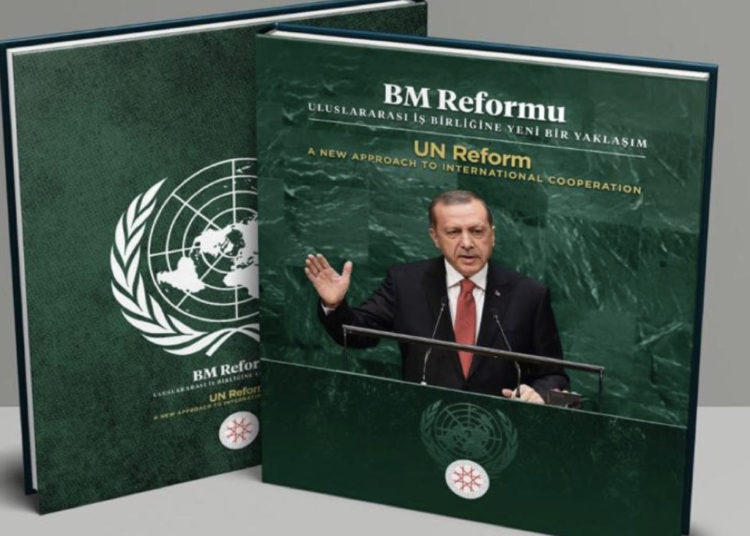Levent Kenez/Stockholm
Turkish President Recep Tayyip Erdoğan, as he did last year, will gift his new book to world leaders with whom he will meet during the United Nations General Assembly (UNGA) this year. A noteworthy fact about the book, which calls for reform of the United Nations system, is that it includes images used without permission. The copyright holder’s logo and watermark can interestingly be seen in some photographs in the book. The reason the Office of the Presidency, with its huge budget, made such an amateur mistake is that the necessary care was not taken in the final reading and editing of the 128-page book, with parts in both Turkish and English.
According to a Nordic Monitor review, some of the images from Shutterstock, a leading provider of stock photography and footage, are featured with their watermarks, meaning that the images are used without permission or royalty payment. According to Shutterstock’s terms of use, displaying or distributing to the public any watermarked or unlicensed Shutterstock content constitutes copyright infringement.
Some pages from the book:
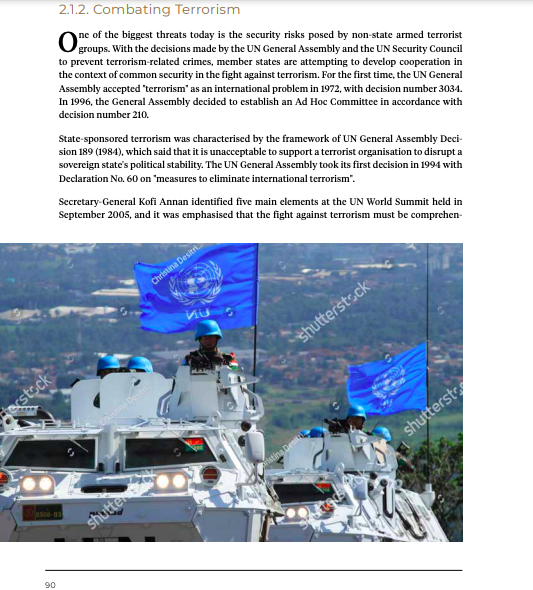
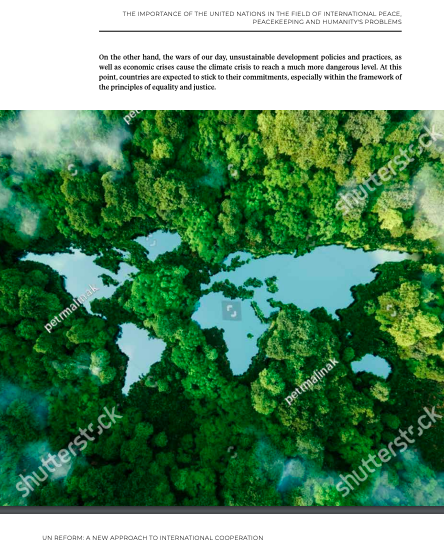

The book, which includes numerous full-page portraits of Erdoğan, focuses on criticism of the permanent and veto-powered five-country system in the Security Council, which Erdoğan has long described with the slogan, “The world is bigger than five.”
In the preface Erdoğan claims that the current international system only protects and grants privileges to developed countries and that disadvantaged countries are crushed under the weight of an unfair price imposed on their shoulders by an unjust global structure, particularly because the five permanent members of the United Nations Security Council use their veto power for their own interests.
The presidency’s director of communications, Fahrettin Altun, who wrote the foreword as in Erdoğan’s other books, states that “[t]he Western-centred mentality, which attempts to understand people and societies solely through power, has alienated the powerless with adjectives such as ‘primitive, savage, and undeveloped’ and through this process has constructed a so-called power of superiority for itself.” However, neither Erdoğan nor ghost-writer Altun mentions much about China and Russia, two permanent members of the Security Council, making it impossible to see the UN system only as a Western hegemonic system.
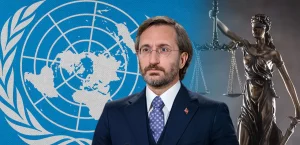
Altun continues to say that “the United Nations, which was founded after World War II with the hope of becoming the voice of all humanity, has devolved into a mechanism that grants privileges only to the ‘strong’ due to its growing structural problems. The entire world has again witnessed how the UN Security Council’s unjust and unequal structure has become dysfunctional in previous crises such as Bosnia and Rwanda, as well as the current crises in Ukraine, Syria, and Palestine.”
A criticism of the Security Council system in the book is that the continents are not represented according to population, and South America and Africa are claimed to be in disadvantageous positions. Also, the absence of any Muslim country as a permanent member is regarded as a problem. “While Europe is represented by two countries in the permanent memberships of the Security Council, there is not a single permanent member from South America and Africa. Nonetheless, the entire European population corresponds to only five percent of the world’s population. South America’s population of over 600 million is not represented by a permanent member on the Security Council. A permanent member representing 1,2 billion individuals from Africa and the Islamic world is absent from the Council. Another aspect that hinders representational justice is its failure to reflect multiculturalism,” the book reads.
When the reader wonders what Turkey proposes as a solution, he or she only comes across a paragraph at the end of the book that says:
“Our solution proposal is the adoption of a perspective that is based on the statement ‘The world is bigger than five’ and focuses on restructuring the UN Security Council [UNSC]. The abolition of the veto power is the first step toward UN reform. A new UN should then be built on comprehensive and principled proposals. This will ensure that all countries worldwide can/will participate in this critical decision-making mechanism. It has been proposed to increase the total number of UNSC members to twenty-five by adding only ten new non-permanent members. Introducing the majority rule to the decision-making system is one of the decisions advocated for a fairer world.”
However, there is no suggestion about how the new members of the Security Council would be elected or which countries they would be.
Erdoğan proposed a “revolutionary United Nations reform” before the UN General Assembly last year with a book titled “A Fairer World is Possible: A Model Proposal for United Nations Reform” and put out by his family’s publishing house, Turkuvaz Kitap.
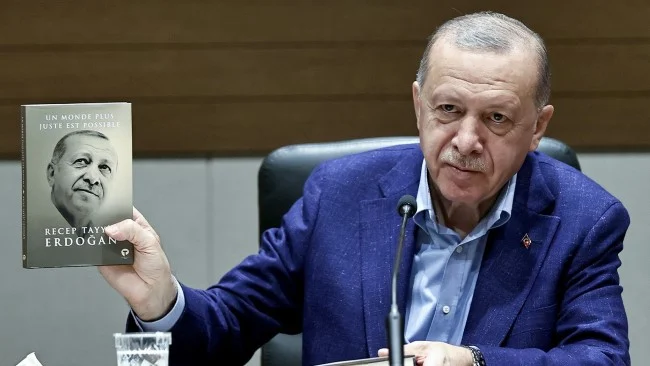
Ömer Murat, a former diplomat and international relations expert, says in criticism that Erdoğan distributes the books with his own photograph on the cover, just like on music CDs , claiming that this type of propaganda was useless last year and didn’t work. According to Murat these books are published mainly to appeal to the Turkish public and that’s why the title in Turkish has been added in larger font. “How many foreign leaders know Turkish?” asks Murat.
“For some reason, when Erdoğan goes to the West, he keeps repeating, ‘The world is bigger than five.’ Well, two of those five are Russia and China. Did you say to [Russian President Vladmir] Putin and [Chinese President Xi] Jinping at the Shanghai Cooperation Organisation [SCO] summit, ‘Waive your veto right, we do not accept this inequality’?” Murat tweeted.
Meanwhile, Erdoğan, who went directly to New York following the SCO Council of Heads of State meeting in Uzbekistan, was seen walking around Central Park on Sunday and taking pictures with tourists and locals. Reminding that important world leaders are in London for Queen Elizabeth’s funeral, the opposition claims that Erdoğan did not attend because leaders were asked not to come in their private jets and that buses would be used to transport them for security reasons.

